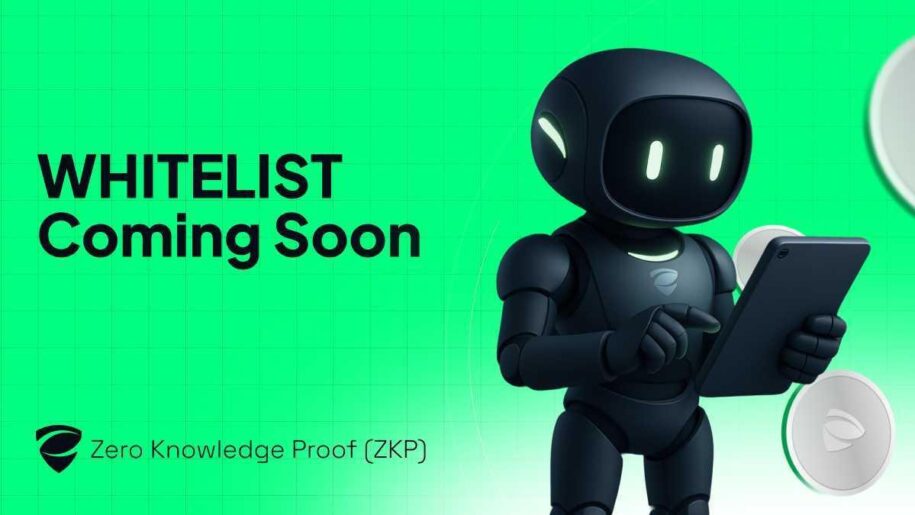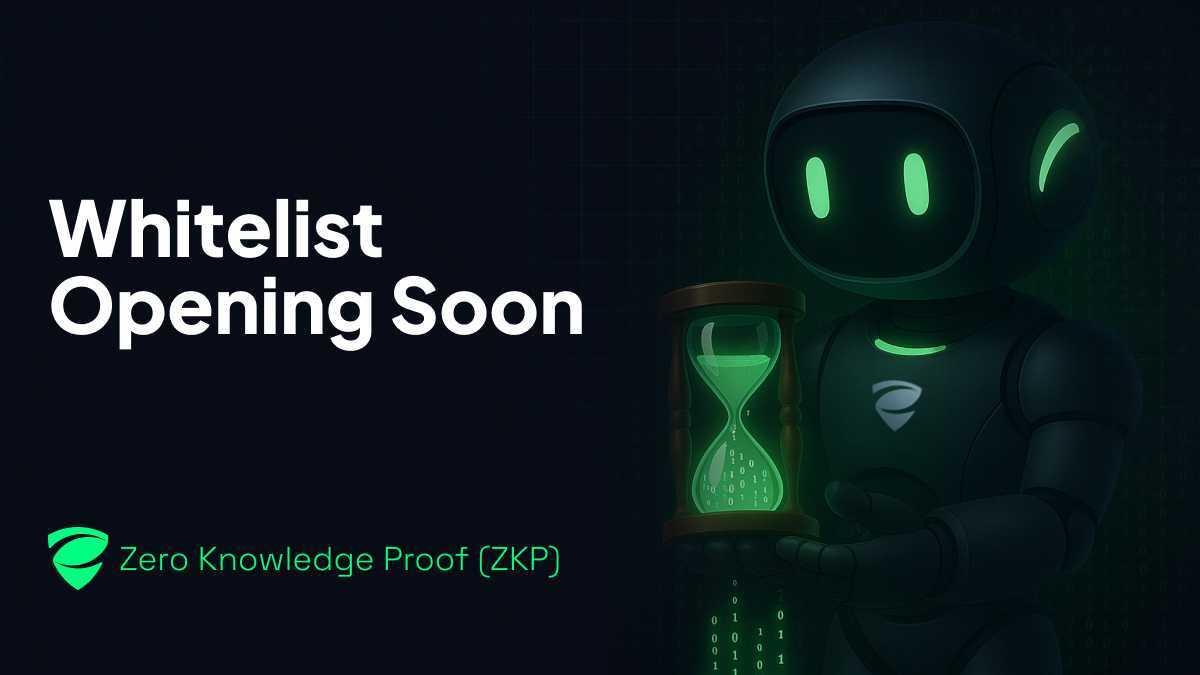Coindoo - 10/7/2025 7:01:47 PM - GMT (+0 )
- 7 October 2025
- |
- 22:00
Secure early access now. The Zero Knowledge Proof (ZKP) whitelist is opening soon, echoing Ethereum’s early entry window with privacy, scalability, and enterprise-ready infrastructure.
When Ethereum was first introduced, very few outside of core developers and early believers could see its potential. Those who entered during its earliest stages had the chance to secure a position before the technology became the backbone of decentralized finance, NFTs, and enterprise applications. Today, a similar moment is unfolding with Zero Knowledge Proof (ZKP). The whitelist for early access is about to open, giving participants a rare chance to join before large players dominate the ecosystem. This opportunity signals a turning point: just as Ethereum’s smart contracts unlocked an entirely new market, ZKP is preparing to make blockchain private, scalable, and enterprise-ready.
Learning from Ethereum’s Early CycleEthereum’s rise wasn’t overnight. In 2015, it introduced smart contracts, which transformed blockchain from a simple ledger into a programmable platform. Early adopters often recall how ETH tokens were accessible at prices that later seemed unimaginable once institutions and enterprises entered the picture. That entry window didn’t last long. Within a few years, Ethereum’s ecosystem became the foundation of DeFi, NFTs, DAOs, and more.
Now the parallel is clear. Zero Knowledge Proof (ZKP) is opening its whitelist stage at a time when privacy and scalability are the industry’s biggest challenges. Like Ethereum, it isn’t offering a single product or side-feature; it is laying the groundwork for a complete ecosystem.
Key parallels to note:
- Ethereum’s defining feature: smart contracts.
- ZKP’s defining feature: verifiable privacy + scalability.
- Ethereum provided programmability; ZKP adds confidentiality and compliance-readiness.
For investors, these parallels mark the whitelist opening as a critical signal. Every blockchain has a moment where it transitions from potential to infrastructure. ZKP is now at that threshold.
What Makes Zero Knowledge Proof (ZKP) DifferentUnlike many networks that try to bolt privacy onto existing chains, Zero Knowledge Proof (ZKP) is being architected as a full Layer 1 infrastructure. Its foundation is built on zk-SNARKs and zk-STARKs, which enable proofs of validity without revealing sensitive information. This is not just about shielding transactions—it’s about creating a scalable system where decentralized apps, financial services, and enterprise solutions can run securely and privately.
Key differentiators:
- Privacy layer: confidential transactions, shielded smart contracts, and selective disclosure.
- Scalability layer: zk-rollups, recursive proofs, and parallel verification for tens of thousands of TPS.
- Developer tools: SDKs for building privacy-first apps without a steep learning curve.
Ethereum’s strength was programmability. ZKP’s strength is making that programmability private, faster, and compliance-friendly. The architecture ensures that it isn’t locked to crypto use cases alone—it’s relevant to industries like healthcare, supply chain, and even secure voting systems.
This breadth makes ZKP more than just another blockchain. It’s a step forward in how decentralized infrastructure should be built.
The Whitelist as the Defining Entry WindowEvery major blockchain has its entry window. For Bitcoin, it was mining before 2013. For Ethereum, it was the presale before smart contracts became mainstream. For Zero Knowledge Proof (ZKP), that defining window is the whitelist that will open soon.
This whitelist isn’t just about token access—it represents the earliest possible stake in what could become the backbone of privacy-preserving blockchain adoption. Once institutional players begin to onboard, the early pricing and availability that the whitelist offers will no longer be possible.
Why this moment matters:
- Early access pricing mirrors Ethereum’s earliest days.
- Whitelist participants secure entry before broader market adoption.
- Institutions and enterprises tend to follow after infrastructure proves itself.
For many, Ethereum’s story is a reminder of how quickly entry costs can rise once real-world adoption accelerates. ZKP is positioning itself for the same trajectory—except with privacy and scalability solved at the base layer.
Real-World Impact Beyond SpeculationEthereum proved that a blockchain could do more than transfer value. Zero Knowledge Proof (ZKP) takes that lesson and builds it into sectors where privacy and compliance are non-negotiable. This includes:
- Finance: Businesses can validate solvency without disclosing internal data.
- Healthcare: Patients can share proofs without exposing sensitive medical history.
- Supply chains: Authenticity can be proven without revealing trade secrets.
- Voting: Elections can be verified as legitimate while keeping ballots private.
Ethereum was the beginning of programmable trust. ZKP takes it further by ensuring that programmable trust is also confidential, scalable, and legally adaptable. This ensures that the ecosystem is not limited to speculative use cases but can serve enterprises, governments, and institutions at scale.
The whitelist is not just about token speculation—it’s about entering early into an infrastructure layer designed to power industries that cannot compromise on privacy or scalability.
Final TakeEthereum’s rise shows what happens when a technology becomes more than just another coin—it becomes infrastructure. Today, Zero Knowledge Proof (ZKP) is preparing for its own defining moment, with the whitelist opening soon. This is not a side project or privacy add-on, but a full blockchain ecosystem designed to scale, protect user data, and adapt to real-world compliance. Every major chain had its early entry point, and ZKP’s whitelist marks that exact moment. For those who remember Ethereum’s presale era, this feels familiar: a chance to join before the institutions arrive and before mainstream adoption makes early entry all but impossible.
This publication is sponsored. Coindoo does not endorse or assume responsibility for the content, accuracy, quality, advertising, products, or any other materials on this page. Readers are encouraged to conduct their own research before engaging in any cryptocurrency-related actions. Coindoo will not be liable, directly or indirectly, for any damages or losses resulting from the use of or reliance on any content, goods, or services mentioned. Always do your own research.
Reporter at Coindoo
Krasimir Rusev is a journalist with many years of experience in covering cryptocurrencies and financial markets. He specializes in analysis, news, and forecasts for digital assets, providing readers with in-depth and reliable information on the latest market trends. His expertise and professionalism make him a valuable source of information for investors, traders, and anyone who follows the dynamics of the crypto world.
read more






